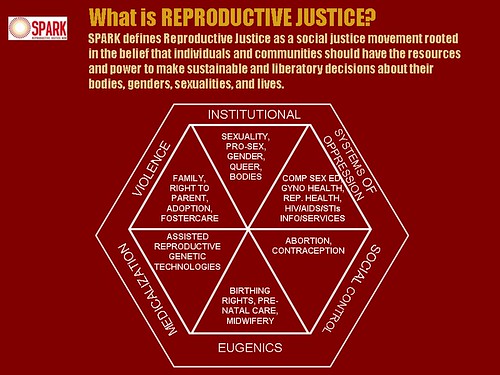Curator's Note
If you look up reproductive justice on YouTube or Google you will get a variety of definitions. Most are centered on women and their right to choose to have or not have children. While this is could be a productive discussion it is also extremely limiting. It suggests that only women can be part of the discussion and work toward reproductive justice. It further limits that discussion to one of choice. This is problematic in two significant ways. First, it assumes that all women have choice now but did not have choice previously. This argument is based on centuries of patriarchy that assumes women never had choices before. As we know some women in some classes, religions, cultures and matriarchal societies did have choice which they did and do exercise. It is also true that many more women did not and do not have choice. Second, this creates an unnecessary divide in communities. As if a uterus is the only requirement for interest in reproduction. Both arguments center on women’s bodies not her agency or the systematic sociohistorical and linguistic constructions that limit, bracket, or reduce access to equitable choices and sustained agency.
A more productive definition of reproductive justice comes from the group SPARK. They define reproductive justice “as a social justice movement rooted in the belief that individuals and communities should have the resources and power to make sustainable and liberatory decisions about their bodies, genders, sexualities and lives.” This inclusive and liberatory definition of reproductive justice takes the conversation in the direction of sustained systematic change. To obtain true social justice everyone must have a voice that is valid. Everyone must play an authentic role in bringing justice to fruition, not just women and girls. What this definition of reproductive justice ultimately does is allow for equity in decision-making based on the idea that all communities receive honest and practical health messages. When communities have access to health care and services, health information, and health messages individuals make decisions that are based on what is beneficial for themselves and their communities.

Add new comment